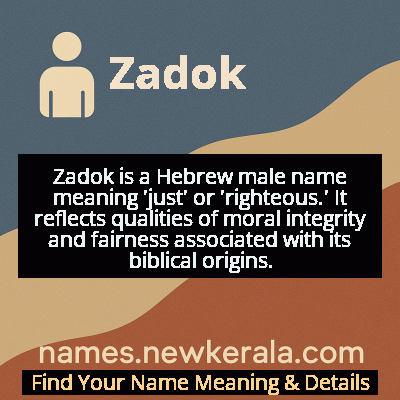Zadok Name Meaning & Details
Origin, Popularity, Numerology Analysis & Name Meaning of Zadok
Discover the origin, meaning, and cultural significance of the name ZADOK. Delve into its historical roots and explore the lasting impact it has had on communities and traditions.
Name
Zadok
Gender
Male
Origin
Hebrew
Lucky Number
3
Meaning of the Name - Zadok
Zadok is a Hebrew male name meaning 'just' or 'righteous.' It reflects qualities of moral integrity and fairness associated with its biblical origins.
Zadok - Complete Numerology Analysis
Your Numerology Number
Based on Pythagorean Numerology System
Ruling Planet
Jupiter
Positive Nature
Optimistic, inspirational, and creative.
Negative Traits
Scattered, exaggerating.
Lucky Colours
Yellow, gold, purple.
Lucky Days
Thursday.
Lucky Stones
Yellow sapphire.
Harmony Numbers
1, 2, 9.
Best Suited Professions
Arts, writing, communication.
What People Like About You
Creativity, optimism.
Famous People Named Zadok
Zadok the Priest
High Priest of Israel
Anointed Solomon as king and established the priestly line that served in the First Temple
Zadok Ben-David
Contemporary Artist
Internationally recognized sculptor known for his intricate metal cut-out works and installations
Rabbi Zadok HaKohen Rabinowitz
Rabbi and Scholar
Prominent Hasidic leader and Talmudic scholar known for his philosophical works
Zadok Allen
Literary Character
Memorable character in H.P. Lovecraft's 'The Shadow Over Innsmouth' representing the town's mysterious history
Name Variations & International Equivalents
Click on blue names to explore their detailed meanings. Gray names with will be available soon.
Cultural & Historical Significance
In Christian tradition, Zadok is referenced in the genealogy of Jesus in Matthew's Gospel, further extending the name's religious significance. The name also appears in Islamic tradition as Saduq, maintaining its association with truthfulness and righteousness across Abrahamic faiths. Throughout history, the name has been carried by various rabbinical scholars and community leaders, reinforcing its connection to spiritual authority and moral leadership. The enduring cultural impact of Zadok is evidenced by its continued use in religious ceremonies, artistic works, and as a symbol of righteous leadership across different cultures and time periods.
Extended Personality Analysis
Individuals named Zadok are often perceived as possessing a strong moral compass and innate sense of justice, living up to the name's meaning of 'righteous.' They tend to be principled, reliable, and deeply committed to their beliefs and values. Zadoks typically exhibit leadership qualities combined with a calm, thoughtful demeanor that inspires trust in others. Their decision-making process is often methodical and considered, reflecting the wisdom associated with their biblical namesake.
These individuals frequently demonstrate loyalty and steadfastness in relationships, whether personal or professional. They may have a natural inclination toward spiritual or philosophical pursuits, seeking deeper meaning in life's experiences. While sometimes perceived as serious or reserved, Zadoks often possess hidden warmth and compassion that emerges in trusted circles. Their integrity and consistency make them valuable friends and colleagues who can be counted on during challenging times. The name carries an expectation of moral strength and reliability that often influences both self-perception and how others interact with them.
Modern Usage & Popularity
In contemporary times, Zadok remains a relatively uncommon but meaningful choice, primarily within Jewish communities and among parents seeking biblical names with strong moral connotations. The name has experienced modest growth in popularity as part of the trend toward unique, historically significant names. While not ranking among the top names in most countries, Zadok maintains a steady presence, particularly in Israel and among Orthodox Jewish communities worldwide. The name's association with Handel's famous coronation anthem has given it some recognition in musical and cultural circles beyond religious contexts. Modern parents choosing Zadok often appreciate its distinctive sound, deep historical roots, and the positive qualities it represents. The name continues to be used across various English-speaking countries, though it remains more prevalent in communities with strong connections to biblical traditions and among those seeking names with spiritual significance.
Symbolic & Spiritual Meanings
Zadok symbolizes righteousness, spiritual authority, and unwavering moral integrity. The name represents the ideal of living in accordance with divine principles and maintaining faithfulness even in challenging circumstances. Symbolically, Zadok embodies the concept of legitimate spiritual leadership and the transmission of sacred traditions across generations. It carries connotations of purity, dedication, and the bridge between earthly and divine realms through priestly service. The name also symbolizes restoration and renewal, as the biblical Zadok helped establish Solomon's reign, which represented a new era of peace and temple worship. In a broader sense, Zadok represents the enduring power of truth and the importance of maintaining ethical standards in leadership positions. The name serves as a reminder of the value of consistency in moral character and the impact that righteous individuals can have on their communities and historical narratives.

